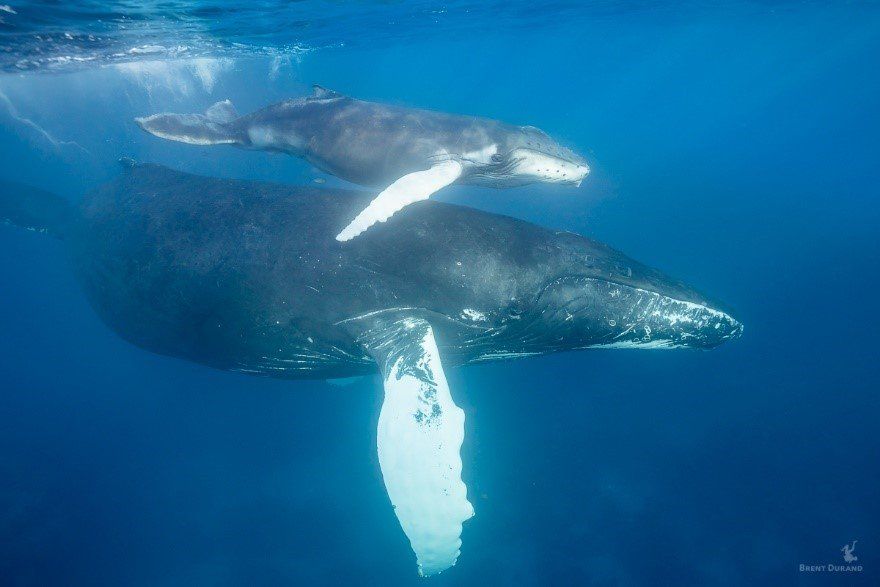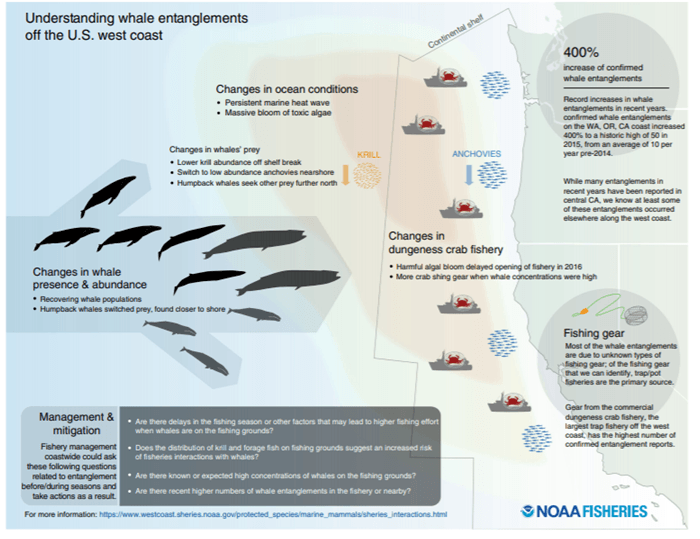Climate Change and Whale Entanglements.
In recent years, variability and intensity of climate events have been increasing, leading to more frequent, longer, and spatially larger marine heatwaves (MHWs) in many areas. This has led to many new challenges for the conservation and management of marine ecosystems.
One area recently impacted by such change is the California Current Large Marine Ecosystem (CCLME). This is a productive coastal upwelling system where upwelling is driven by wind which brings enriched cool water to the surface, allowing for a diverse variety of species to thrive. Additionally, this ecosystem supports many fisheries. Between 2014-2016 there was a MHW that occurred in this region, which resulted in multi-year warming events. The main effect of this was that whale entanglements increased and reached record numbers during this time. The most common species of whale that was caught was the humpback whale ( Megaptera novaeangliae ).
Investigations found that such increases in whale entanglement is a result of the combination of four main reasons, which stemmed from the MHW and are linked to one another. Firstly, a continuous bloom in the toxic Pseudo-nitzchidia diatoms arose, that led to domoic acid persisting within the ecosystem (this is a neurotoxin known to impact marine wildlife). This harmful bloom had the knock-on effect of delaying the opening of the commercial Dungeness crab ( Metacarcinus magister ) fisheries in California from the usual November in 2015 to March 2016. Additionally, there were changes in the biodiversity of pelagic species present, specifically, a strong presence of sub-tropical and warm affinity species. This meant that there was a lower abundance of krill off the shore than normal, and so whales switched their foraging behaviours towards near shore anchovies. The whale populations surrounding this area were also known to be growing in numbers prior to the catastrophic entanglements and so whales were present in higher concentrations. Altogether, these four effects caused a high abundance of whales to be closer in contact with crab fishing gear, resulting in more tragic entanglements.
So how can this be prevented in the future? Long term climate change is already showing changes to coastal upwelling ecosystems, threatening the sustainability of fisheries and natural food webs. Therefore, there is an urgent need to prepare climate-ready fisheries which allow for marine ecosystems to thrive. This will require cooperation of fisheries, resource managers and conservation scientists to ensure that such large-scale entanglements of marine mammals are prevented.
References:
Hobday, A. J. et al. A hierarchical approach to defining marine heatwaves.Prog. Oceanogr. 141, 227–238 (2016).
Huyer, A. Coastal upwelling in the California Current System. Prog. Oceanogr. 12, 259–284 (1983)
Santora, J.A. et al. Habitat compression and ecosystem shifts as potential links between marine heatwave and record whale entanglements.
SHARE THIS ARTICLE















